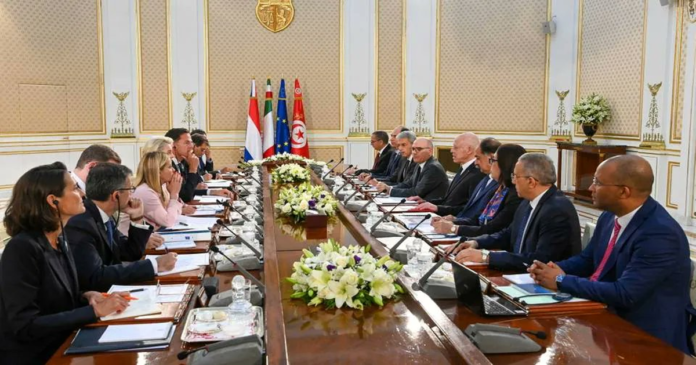The European Union made a more than $1 billion aid package to Tunisia to revive that country’s struggling economy and lessen the number of unauthorized immigrants crossing the Mediterranean Sea.
EU offers Tunisia over one bn euro: The heavily indebted country in North Africa, negotiating for an IMF bailout credit, serves as a transit point for migrants and asylum seekers trying the dangerous journeys to Europe.
Ursula von der Leyen, the head of the European Commission, said during a joint visit with the prime ministers of Italy and the Netherlands that the EU is prepared to provide Tunisia with 900 million euros in long-term assistance as well as 150 million euros in immediate assistance to “strengthen our relationship.”
In addition to trade and investment, she said, it would provide 100 million euros in support this year to help Tunisia manage its borders and fight human trafficking.
Von der Leyen stated, “We both have a tremendous interest in dismantling the sleazy business model of smugglers and traffickers. “Seeing how they knowingly endanger human lives for gain is disgusting.”
To create jobs and “boost growth here in Tunisia,” she claimed that further cooperation initiatives with the union would assist Tunisia in exporting clean, renewable energy to Europe and provide high-speed broadband.
Following the four-way discussions with President Kais Saied, Von der Leyen voiced her hope for concluding an EU-Tunisia deal before the upcoming European summit.
‘Long and arduous road’
She emphasized that the EU is Tunisia’s top trade and investment partner and has “supported Tunisia’s path to democracy” since it became the epicenter of the Arab Spring public revolts in 2011, referring to it as “a long and difficult road.”
With her Dutch colleague Mark Rutte and Italian counterpart Giorgia Meloni, Von der Leyen traveled to Tunisia to meet with Saied, who has been in nearly sole control of the country since 2021.
Rights organizations have charged him with an “authoritarian drift” for imprisoning opposition activists and limiting civil rights in what Amnesty International has dubbed “a witch hunt.”
Last week, EU states agreed on measures to hasten the return of migrants to their countries of origin or “safe” transit countries, such as Tunisia, under pressure to lower migrant inflows.
During her second visit to Tunisia within a week, Italy’s far-right premier Meloni expressed her satisfaction with the EU’s proposal for “a genuine partnership to address the migratory crisis and development issues” in Tunisia.
Less than 150 kilometers (90 miles) separate Tunisia from the Italian island of Lampedusa, which has traditionally served as a transit point for migrants, primarily from sub-Saharan African nations.
According to the most recent numbers from the UN Agency for refugees, 51,215 migrants have entered Italy illegally by water so far this year, an increase of more than 150% over the previous year. About half of these migrants are from Tunisia, while the remainder are from Libya.
Almost 1,000 people have perished or been killed in ships this year.
The migrant population, increasingly composed of individuals from Tunisia, reflects the country’s current crisis marked by high unemployment and inflation. Tunisia’s tourism-dependent economy also suffered significant damage due to the Covid outbreak.
.Not the ‘border guard’ of Europe
Last year, Tunisia and the IMF negotiated an in-principle agreement for a $2 billion bailout loan.
However, negotiations have stopped due to the fund’s demands for reforms, particularly those involving state-run businesses and eliminating government subsidies for essential products, which Tunis believes may exacerbate societal unrest.
Tuesday saw Saied criticizing the Washington-based IMF’s “diktats” once more.
Saied has promised to take “urgent measures” to address immigration into Tunisia.
After claiming in February that “hordes” of immigrants from sub-Saharan Africa were to blame for increased violence and constituted a “demographic” threat to the country with an Arab majority, Tunisian rights groups accused him of using hate speech.
Following his speech, attacks against migrants dramatically increased, and hundreds left the nation.
Saied said he opposed making Tunisia Europe’s “border guard” while touring a migrant camp in Sfax, a seaside city where many people leave for sea voyages.
The Tunisian Forum for Economic and Social Rights condemned the visit of the three European leaders as an attempt to “blackmail” Tunisia, offering financial support in exchange for heightened border security.

